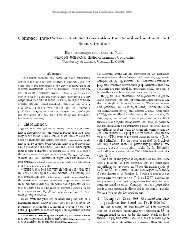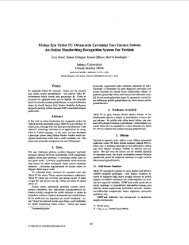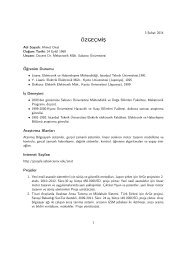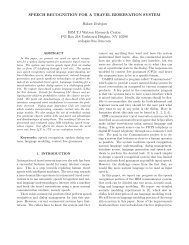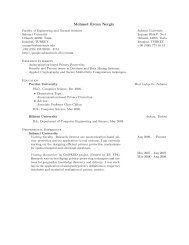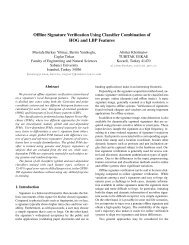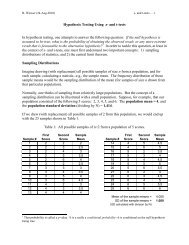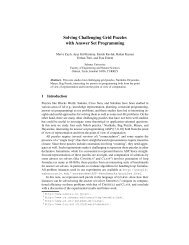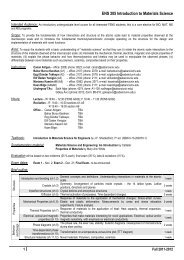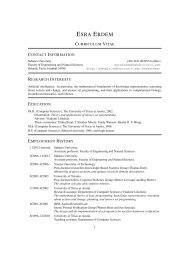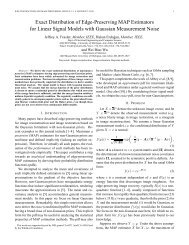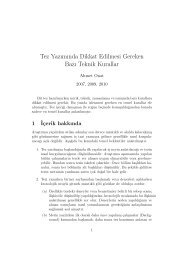Guidance Notes for the Rules of Korfball (from 1 August 2009)
Guidance Notes for the Rules of Korfball (from 1 August 2009)
Guidance Notes for the Rules of Korfball (from 1 August 2009)
You also want an ePaper? Increase the reach of your titles
YUMPU automatically turns print PDFs into web optimized ePapers that Google loves.
For how <strong>the</strong> time out is administered by <strong>the</strong> referee see <strong>the</strong> guidance notes <strong>for</strong> § 3.1 b.In <strong>the</strong> case <strong>of</strong> a bleeding player <strong>the</strong> player must leave <strong>the</strong> field <strong>of</strong> play immediately and may not returnuntil <strong>the</strong> bleeding has stopped, <strong>the</strong> wound has been covered and <strong>the</strong> blood has been removed.Where a timekeeper has been appointed in accordance with § 2.4 a and <strong>the</strong> competition rules haveprescribed that in <strong>the</strong> last two minutes <strong>of</strong> each half <strong>the</strong> time clock shall be stopped whenever <strong>the</strong> refereeblows his whistle to stop <strong>the</strong> game (see <strong>the</strong> guidance notes <strong>for</strong> § 3.1), <strong>the</strong> signal <strong>for</strong> ending each half <strong>of</strong> <strong>the</strong>match shall be made by <strong>the</strong> timekeeper.fto take action against misbehaviour by <strong>the</strong> players, coaches, substitute players and o<strong>the</strong>r personsattached to <strong>the</strong> teamMisbehaviour includes: -• striking, punching, kicking or intentionally running down an opponent• repeated infringement <strong>of</strong> <strong>the</strong> rules, especially after a warning• <strong>the</strong> deliberate moving <strong>of</strong> <strong>the</strong> post during a shot• <strong>the</strong> utterance <strong>of</strong> insults, no matter to whom addressed• making remarks against <strong>the</strong> referee about his knowledge <strong>of</strong> <strong>the</strong> rules• leaving <strong>the</strong> field without in<strong>for</strong>ming <strong>the</strong> referee• delaying <strong>the</strong> retaking <strong>of</strong> positions after a time out and failing to in<strong>for</strong>m <strong>the</strong> referee <strong>of</strong> a substitutionBoth teams intentionally delaying <strong>the</strong> game in turns can also be regarded as misbehaviour (see <strong>the</strong>guidance note <strong>for</strong> § 3.6 g). As soon as <strong>the</strong> referee notices this type <strong>of</strong> play, he issues a warning toboth captains toge<strong>the</strong>r. If, after <strong>the</strong> referee's warning, both teams continue to play in <strong>the</strong> samemanner, <strong>the</strong> referee is empowered to stop <strong>the</strong> match.The referee can consider any unsporting action as misbehaviour, e.g. inadmissible <strong>for</strong>ms <strong>of</strong> appealor demonstrative gestures against <strong>the</strong> referee.During <strong>the</strong> match <strong>the</strong> referee shall indicate a <strong>for</strong>mal warning by showing a yellow card to <strong>the</strong> player,coach, substitute player or any o<strong>the</strong>r person concerned attached to a team.The referee sends someone <strong>of</strong>f by showing him a red card. A person is sent straight <strong>of</strong>f if he commits acase <strong>of</strong> serious misbehaviour (examples <strong>of</strong> which may be found in <strong>the</strong> referees guidance notes <strong>for</strong> <strong>the</strong>coding <strong>of</strong> <strong>of</strong>fences). In all cases <strong>of</strong> serious misbehaviour an immediate red card is shown whe<strong>the</strong>r or not<strong>the</strong> person had previously had a yellow card shown <strong>for</strong> misbehaviour.A person shown a red card must leave <strong>the</strong> playing area (as defined in § 1.1 <strong>of</strong> <strong>the</strong> <strong>Rules</strong> <strong>of</strong> <strong>Korfball</strong>).The person concerned must sit in <strong>the</strong> area reserved <strong>for</strong> spectators or leave <strong>the</strong> hall altoge<strong>the</strong>r,whatever he chooses.Should any person who has received a yellow card misbehave <strong>for</strong> a second time, <strong>the</strong>n he must be sent <strong>of</strong>f.In this case <strong>the</strong> referee shall first show a yellow card and <strong>the</strong>n immediately follow this by showing a redcard.Competition rules should prescribe when <strong>the</strong> jurisdiction <strong>of</strong> <strong>the</strong> referee starts and ends with respect tooccurrences <strong>of</strong> misconduct <strong>for</strong> which a card can be shown. For IKF matches this will be <strong>from</strong> <strong>the</strong> time<strong>the</strong> team sheet is handed in (declaring which players will start and which players will be substitutes)until <strong>the</strong> match <strong>for</strong>m is signed by <strong>the</strong> captain and referee.Misconduct outside this period may still be reported to <strong>the</strong> appropriate authority in accordance with<strong>the</strong> competition rules or <strong>the</strong> regulations <strong>of</strong> <strong>the</strong> national organization.If misconduct takes place be<strong>for</strong>e <strong>the</strong> match, or during <strong>the</strong> half time period, <strong>the</strong>n <strong>the</strong> yellow or red cardshall be shown to <strong>the</strong> player, coach, substitute player or any o<strong>the</strong>r person attached to <strong>the</strong> teamconcerned at that time and <strong>the</strong> captain and coach <strong>of</strong> both teams shall be in<strong>for</strong>med be<strong>for</strong>e <strong>the</strong> next halfbegins.If <strong>the</strong> competition regulations allow it, a yellow or red card may be shown <strong>for</strong> any misconduct thattakes place immediately after <strong>the</strong> match.Unless stated o<strong>the</strong>rwise in <strong>the</strong> competition regulations, this will be at any time up to when <strong>the</strong> match <strong>for</strong>m(which shall list any cards shown be<strong>for</strong>e, during, or immediately after <strong>the</strong> match) is signed by <strong>the</strong> captainand referee. Since <strong>the</strong> match <strong>for</strong>m is signed by a representative <strong>of</strong> <strong>the</strong> team concerned (i.e. <strong>the</strong> captain), itshall be sufficient <strong>for</strong> <strong>the</strong> card to be shown to <strong>the</strong> person concerned and <strong>the</strong> fact recorded on <strong>the</strong> match<strong>for</strong>m.A coach or substitute player who has been given a red card may not subsequently take part in <strong>the</strong> matchas a player or sit on <strong>the</strong> team bench. He must leave <strong>the</strong> playing area completely.4



